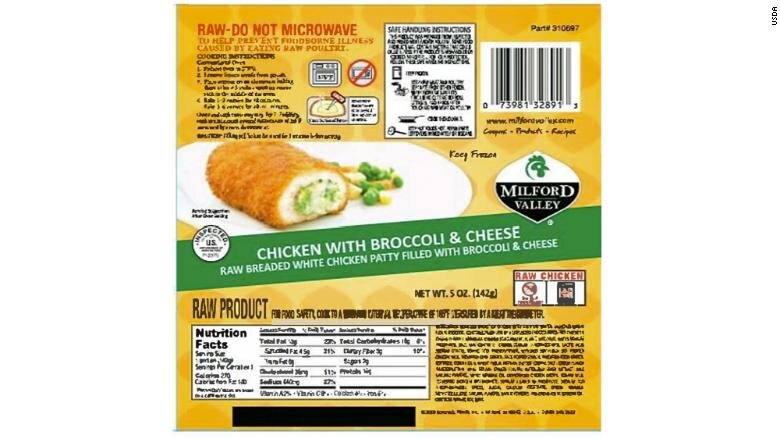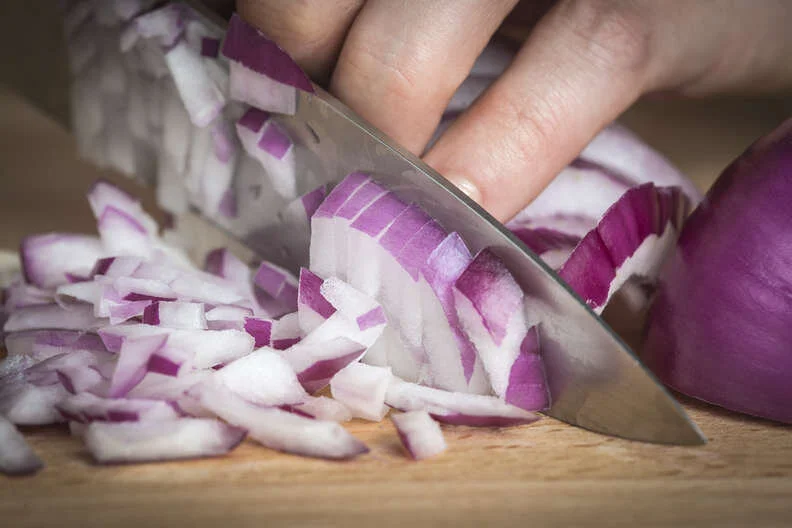
Welcome to iGrow News, Your Source for the World of Indoor Vertical Farming
Nearly 60,000 Pounds of Frozen Raw Chicken Products Sold at Aldi and Other Stores Recalled
Serenade Foods is recalling nearly 60,000 pounds of frozen, raw, breaded and pre-browned stuffed chicken products that could be contaminated with Salmonella Enteritidis, the USDA Food Safety and Inspection Service announced Monday.
By Christina Maxouris
August 10, 2021
View this video here
(CNN) Serenade Foods is recalling nearly 60,000 pounds of frozen, raw, breaded and pre-browned stuffed chicken products that could be contaminated with Salmonella Enteritidis, the USDA Food Safety and Inspection Service announced Monday.
The products were produced on February 24 and February 25, 2021, and were shipped to distributors across the country, the service said.
A label of one of the Serenade Foods products included in the recall
They include specific lots of the Dutch Farms Chicken with Broccoli & Cheese packages; Milford Valley Chicken with Broccoli & Cheese; Milford Valley Chicken Cordon Bleu; Kirkwood Raw Stuffed Chicken, Broccoli & Cheese; and Kirkwood Raw Stuffed Chicken Cordon Bleu, which is sold at Aldi.
The service said it was "concerned" that some of these products may be in Americans' freezers and urged consumers not to eat them.
"These products should be thrown away or returned to the place of purchase," it said.
The Service said it has been working with the US Centers for Disease Control and Prevention and other health officials to investigate an outbreak of 28 Salmonella Enteritidis illnesses across eight different states. The illnesses' timelines range from February 21 through June 28.
A second product involved in the recall
"Unopened intact packages of raw, frozen, breaded chicken stuffed with broccoli and cheese were collected from an ill person's home and tested positive for the outbreak strain of Salmonella Enteritidis," the service said. "FSIS continues to work with the CDC and state and local public health partners on this investigation."
Eating food that is contaminated with Salmonella can cause a bacterial food borne illness called salmonellosis which can cause diarrhea, abdominal cramps, and fever within 12 to 72 hours after eating the product.
"Most people recover without treatment. In some persons, however, the diarrhea may be so severe that the patient needs to be hospitalized. Older adults, infants, and persons with weakened immune systems are more likely to develop a severe illness. Individuals concerned about an illness should contact their health care provider," it said.
Peaches Recalled Nationwide After 101 Sickened, 17 Hospitalized Across North America
If you bought peaches at any of the country’s largest supermarkets this summer—including Target, Walmart, and Kroger—you should probably toss ‘em
by Jessica Fu
08.25.2020
If you bought peaches at any of the country’s largest supermarkets this summer—including Target, Walmart, and Kroger—you should probably toss ‘em.
Federal agencies on Monday expanded a nationwide recall of peaches linked to the country’s largest stone fruit company, Prima Wawona, due to potential contamination with Salmonella Enteritidis. The recall, first announced last week, was originally limited to bagged fruit, and has now been extended to individual and loose peaches as well. Both yellow and white, conventional and organic peaches are affected. A full list of recalled products, including specific produce codes, can be found here.
According to the Centers for Disease Control and Prevention (CDC), at least 68 individuals have become sickened by the outbreak strain, Salmonella Enteritidis, and 14 have been hospitalized across nine states. In Canada, U.S.-imported peaches have sickened an additional 33 people in two provinces.
The Food and Drug Administration (FDA) is urging eaters to toss any of the specified fruit purchased from some of the country’s largest grocery chains—such as Aldi, Walmart, Kroger, and Target—between June and August, including peaches you might have in your freezer. It’s also encouraging both restaurants and suppliers to throw potentially contaminated fruit away.
“Salmonella is really sturdy, meaning it’s very good at surviving on plants like fruit and produce.”
Salmonella is a foodborne illness that can cause gastrointestinal issues, ranging from stomach aches to bloody feces. While most infections resolve themselves without treatment within hours or a few days, many eaters—including children, elderly people, and those who may have compromised immune systems—face a heightened risk for serious complications.
There are numerous points along any supply chain where fruits and vegetables can be infected with illness-causing bacteria. This can happen anywhere from farm fields, where animal feces can spread disease to produce; to processing plants that fail to properly sanitize equipment; to one’s own home, where raw meat or eggs can cross-contaminate with other groceries, said Mary Anne Amalaradjou, an associate professor of food microbiology at the University of Connecticut
“All of these factors can play a role in how salmonella can get into food and how it gets into us,” she said. In the past, Amalardjou has studied this particular outbreak strain and its ability to survive in mangos, finding that Salmonella Enteritidis can stay alive inside fruit for multiple days, and can remain on surfaces even after washing.
“Salmonella is really sturdy, meaning it’s very good at surviving on plants like fruit and produce,” she said.
In addition to our peach problem, an outbreak of Salmonella Newport linked to red onions has sickened over 500 people in the U.S. and Canada, and a Cyclospora outbreak linked to bagged salads sickened nearly 700.
For this particular outbreak, FDA and CDC have reportedly traced multiple infections back to Prima Wawona, the nation’s biggest stone fruit supplier.
“We’re conducting this voluntary recall in cooperation with the FDA out of consideration for the wellbeing and safety of our customers and consumers,” said George Nikolich, Prima Wawona’s vice president of technical operations in a press release. “We continue to be committed to serving consumers with high quality fruit.”
This isn’t the first time the company has been linked to foodborne illness. In the summer of 2014, it had to recall peaches, nectarines, plums, and pluots due to potential listeria contamination, food safety lawyer Bill Marler noted for Food Poisoning Journal.
You couldn’t be blamed for feeling like 2020 has been banner summer for foodborne illnesses: In addition to our peach problem, an outbreak of Salmonella Newport linked to red onions has sickened over 500 people in the U.S. and Canada, and a Cyclospora outbreak linked to bagged salads sickened nearly 700.
Outbreaks of foodborne illness occur every year, and advancements in detection technology help officials pinpoint and trace pathogens along the supply chain with increasing efficiency.
Nonetheless, Amalardjou said, there’s no reason to feel too alarmed quite yet: Outbreaks of foodborne illness occur every year, and advancements in detection technology help officials pinpoint and trace pathogens along the supply chain with increasing efficiency.
With peach season in full swing in numerous growing regions, you can likely rest assured that stone fruit produced by other companies or sold at a nearby farmers’ market is still safe to enjoy.
“I’ll still have my peaches,” Amalaradjou said. “I love my peaches.” Safe peaching is just a matter of keeping an eye on FDA’s recall list, and steering clear of any fruit that gets flagged.
We will continue to update this story as it evolves.
Jessica Fu is a staff writer for The Counter.
Lead photo: Jessica Fu
US: Throw Away Your Onions, They're Being Recalled Over Salmonella
It started with red onions, but now the recall has expanded quite a bit
It Started With Red Onions, But Now The Recall
Has Expanded Quite A Bit
Updated on 8/14/2020
The FDA says you probably need to chuck your onions in the bin. A recall of the delicious tear-inducing vegetable is happening over a "multistate outbreak of Salmonella Newport infections."
The FDA has tracked the outbreak back to Thomson International, Inc. in California, but if you're like me, the onions in your kitchen don't have a label on them. In that case, the FDA says you should throw them out. "If you cannot tell if your onion is part of the recall, or your food product contains recalled onions, you should not eat, sell, or serve it, and should throw it out," the FDA says in its announcement.
Anything from Thomson shipped since May 1, 2020, is part of the recall.
The initial recall was on red onions, which are believed to be the source of the problem. However, the recall has expanded to include red, yellow, white, and sweet yellow onions due to the potential for cross-contamination. Currently, the CDC is reporting cases of Salmonella in 34 states with 396 reported illnesses and 59 hospitalizations. The name of the company may not be familiar, but the products have been distributed in all 50 states, the District of Columbia, and Canada, where there is also a recall. The US recall started on August 1, a day after the Public Health Agency of Canada issued a recall on red onions from Thomson International."
The onions were distributed... under the brand names Thomson Premium, TLC Thomson International, Tender Loving Care, El Competitor, Hartley’s Best, Onions 52, Majestic, Imperial Fresh, Kroger, Utah Onions, and Food Lion," the recall states. You can find a list of label images in the FDA recall.
There are a whole lot of varieties of the recalled packaging, with some having been sold at Kroger and Walmart locations.
The FDA and CDC ask that anyone experiencing symptoms contact their health care provider immediately. Symptoms of salmonellosis include diarrhea, fever, and stomach cramps. If it gets more severe, symptoms may also include a fever, aches, headaches, lethargy, rash, and blood in urine or stool, the FDA says.
So, check the kitchen and don't risk it.
Lead photo: SHUTTERSTOCK.COM









